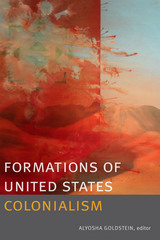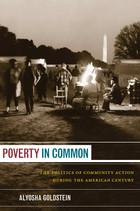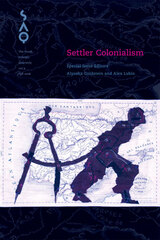3 books about Goldstein, Alyosha

Formations of United States Colonialism
Alyosha Goldstein
Duke University Press, 2014
Bridging the multiple histories and present-day iterations of U.S. settler colonialism in North America and its overseas imperialism in the Caribbean and the Pacific, the essays in this groundbreaking volume underscore the United States as a fluctuating constellation of geopolitical entities marked by overlapping and variable practices of colonization. By rethinking the intertwined experiences of Native Americans, Puerto Ricans, Chamorros, Filipinos, Hawaiians, Samoans, and others subjected to U.S. imperial rule, the contributors consider how the diversity of settler claims, territorial annexations, overseas occupations, and circuits of slavery and labor—along with their attendant forms of jurisprudence, racialization, and militarism—both facilitate and delimit the conditions of colonial dispossession. Drawing on the insights of critical indigenous and ethnic studies, postcolonial theory, critical geography, ethnography, and social history, this volume emphasizes the significance of U.S. colonialisms as a vital analytic framework for understanding how and why the United States is what it is today.
Contributors. Julian Aguon, Joanne Barker, Berenika Byszewski, Jennifer Nez Denetdale, Augusto Espiritu, Alyosha Goldstein, J. K?haulani Kauanui, Barbara Krauthamer, Lorena Oropeza, Vicente L. Rafael, Dean Itsuji Saranillio, Lanny Thompson, Lisa Uperesa, Manu Vimalassery
Contributors. Julian Aguon, Joanne Barker, Berenika Byszewski, Jennifer Nez Denetdale, Augusto Espiritu, Alyosha Goldstein, J. K?haulani Kauanui, Barbara Krauthamer, Lorena Oropeza, Vicente L. Rafael, Dean Itsuji Saranillio, Lanny Thompson, Lisa Uperesa, Manu Vimalassery
[more]

Poverty in Common
The Politics of Community Action during the American Century
Alyosha Goldstein
Duke University Press, 2012
After the Second World War, the idea that local community action was indispensable for the alleviation of poverty was broadly embraced by US policymakers, social scientists, international development specialists, and grassroots activists. Governmental efforts to mobilize community action in the name of democracy served as a volatile condition of possibility for poor people and dispossessed groups negotiating the tension between calls for self-help and demands for self-determination in the era of the Cold War and global decolonization. In Poverty in Common, Alyosha Goldstein suggests new ways to think about the relationship among liberalism, government, and inequality in the United States. He does so by analyzing historical dynamics including Progressive-era reform as a precursor to community development during the Cold War, the ways that the language of "underdevelopment" articulated ideas about poverty and foreignness, the use of poverty as a crucible of interest group politics, and radical groups' critical reframing of community action in anticolonial terms. During the mid-twentieth century, approaches to poverty in the United States were linked to the racialized and gendered negotiation of boundaries—between the foreign and the domestic, empire and nation, violence and order, and dependency and autonomy.
[more]

Settler Colonialism, Volume 107
Alex Lubin
Duke University Press
At a time when the Chinese are being labeled the “new colonialists,” this special issue of SAQ revisits the history of settler colonialism in such varied societies as the United States, South Africa, Eritrea, and Palestine/Israel. This issue examines similarities and differences among the diverse historical, geographical, and economic instances of settler colonialism, the practice of colonists moving permanently to a new settlement and, in some instances, growing to outnumber the indigenous inhabitants. Avoiding an oversimplified settler-native dichotomy, contributors engage current debates about the postcolonial to unsettle reductive chronologies of decolonization, addressing how formations of modern settler colonialism, both successful and failed projects (the Italians in Eritrea), compare with more general historical developments of colonial empire.
Essays consider how race, sexuality and gender, and ethnicity shape experiences of settler colonialism, how public and private space are administered, how citizenship laws establish boundaries of national inclusion and exclusion, how religious motives drive settler colonialism, and how settler colonial regimes appropriate and “cleanse” indigenous cultures and histories. One essay investigates the interwoven ideological rationales for cultural pluralism, Zionism, and opposition to empire in the United States prior to World War I, highlighting the seemingly paradoxical call for the support of a Zionist settlement of Israel on grounds that establishing a Jewish state through colonial appropriation paralleled American development. Another contributor argues that white settler colonialism in the United States is articulated within the present-day constellation of neoliberalism and post–civil rights “color-blind” discourse, focusing on the intersections of the U.S. vote against the UN Declaration on the Rights of Indigenous Peoples in 2007, the U.S. Supreme Court ruling on City of Sherrill v. Oneida Indian Nation of New York in 2005, and antisovereignty groups organizing against American Indian self-determination. Another offers the current situation in Darfur as a provocative rendering of postcolonial settler violence.
Essays consider how race, sexuality and gender, and ethnicity shape experiences of settler colonialism, how public and private space are administered, how citizenship laws establish boundaries of national inclusion and exclusion, how religious motives drive settler colonialism, and how settler colonial regimes appropriate and “cleanse” indigenous cultures and histories. One essay investigates the interwoven ideological rationales for cultural pluralism, Zionism, and opposition to empire in the United States prior to World War I, highlighting the seemingly paradoxical call for the support of a Zionist settlement of Israel on grounds that establishing a Jewish state through colonial appropriation paralleled American development. Another contributor argues that white settler colonialism in the United States is articulated within the present-day constellation of neoliberalism and post–civil rights “color-blind” discourse, focusing on the intersections of the U.S. vote against the UN Declaration on the Rights of Indigenous Peoples in 2007, the U.S. Supreme Court ruling on City of Sherrill v. Oneida Indian Nation of New York in 2005, and antisovereignty groups organizing against American Indian self-determination. Another offers the current situation in Darfur as a provocative rendering of postcolonial settler violence.
[more]
READERS
Browse our collection.
PUBLISHERS
See BiblioVault's publisher services.
STUDENT SERVICES
Files for college accessibility offices.
UChicago Accessibility Resources
home | accessibility | search | about | contact us
BiblioVault ® 2001 - 2024
The University of Chicago Press









